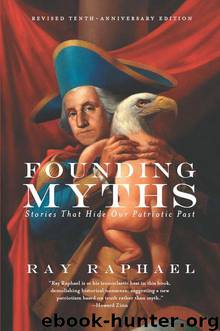Founding Myths by Raphael Ray

Author:Raphael, Ray [Raphael, Ray]
Language: eng
Format: mobi, epub
ISBN: 9781595589743
Publisher: New Press, The
THE AMERICAN REVOLUTION: A GLOBAL WAR
The French navy and army that enabled the victory at Yorktown were no strangers to their British adversaries. The American Revolution marked the fifth time in less than a century that Britain and France had been at war with each other. For thirty-six years (1689–1697, 1701–1713, 1744–1748, 1754–1763, 1778–1781) these two colonial powers had battled for dominance in Europe and around the world. The debt Britain accrued during the previous conflict, known in this country as the French and Indian War, led to increased British taxation of her American colonies. This met great resistance, culminating in the Revolutionary War. American rebels, realizing they could not win the war alone, declared their independence in large measure so they could receive aid from France; the French government could not openly support the United States unless there was a United States, an actual nation. With French money, French troops, French arms and ammunition, and French ships, Americans were able to counter British attempts to quash their rebellion. The causes, the politics, the fighting, and the outcome of the American Revolution were integrally linked to the ongoing struggle for supremacy first between two European nations and ultimately among all European powers.
In 1763, British victory in the French and Indian War had caused France to lose its stake on the North American mainland. When British colonists declared independence from their mother country thirteen years later, the French monarchy—no great friend to the cause of “libertyâ€â€”saw an opportunity to strike back. Once the rebels had proved their mettle with the victory at Saratoga, France jumped into the fray. France had not been able to beat Britain alone, but with the help of others, it might be able to cripple, or at least maim, its archrival.
France tried to get Spain to oppose Britain. Initially, Spain declined; governmental leaders did not wish to give credence to the American rebellion, fearing it might inspire Spanish colonies to follow suit. But Spain had many good reasons for joining the fight against the world’s dominant naval power. Britain had seized Gibraltar, the Spanish fort that controlled the entrance to the Mediterranean. It had also taken the island of Minorca, off Spain’s eastern coast. It held the former Spanish colony of Florida, and by controlling Honduras, Jamaica, and several smaller islands, it vied with Spain for dominance in the West Indies, key to its empire in Central and South America. Following the French defeat in 1763, Spain and Britain were the only colonial powers competing for the mainland of North America. If Britain could be expelled, Spain might gain control of the Mississippi and extend its hegemony throughout most of the continent.
In April 1779, Spain allied with France against Britain. It did not formally ally with the United States, but by waging war on Britain, Spain played a major role in the American Revolution. Troops, ships, and money that Britain might have used to quell the rebellion had to be used against Spain instead. In the later
Download
This site does not store any files on its server. We only index and link to content provided by other sites. Please contact the content providers to delete copyright contents if any and email us, we'll remove relevant links or contents immediately.
| African Americans | Civil War |
| Colonial Period | Immigrants |
| Revolution & Founding | State & Local |
Cat's cradle by Kurt Vonnegut(15353)
Pimp by Iceberg Slim(14506)
4 3 2 1: A Novel by Paul Auster(12392)
Underground: A Human History of the Worlds Beneath Our Feet by Will Hunt(12097)
The Radium Girls by Kate Moore(12028)
Wiseguy by Nicholas Pileggi(5784)
The Fire Next Time by James Baldwin(5444)
Perfect Rhythm by Jae(5403)
American History Stories, Volume III (Yesterday's Classics) by Pratt Mara L(5307)
Paper Towns by Green John(5191)
Pale Blue Dot by Carl Sagan(5008)
A Higher Loyalty: Truth, Lies, and Leadership by James Comey(4963)
The Mayflower and the Pilgrims' New World by Nathaniel Philbrick(4502)
The Doomsday Machine by Daniel Ellsberg(4490)
Killers of the Flower Moon: The Osage Murders and the Birth of the FBI by David Grann(4447)
The Sympathizer by Viet Thanh Nguyen(4390)
Too Much and Not the Mood by Durga Chew-Bose(4348)
The Borden Murders by Sarah Miller(4325)
Sticky Fingers by Joe Hagan(4198)
